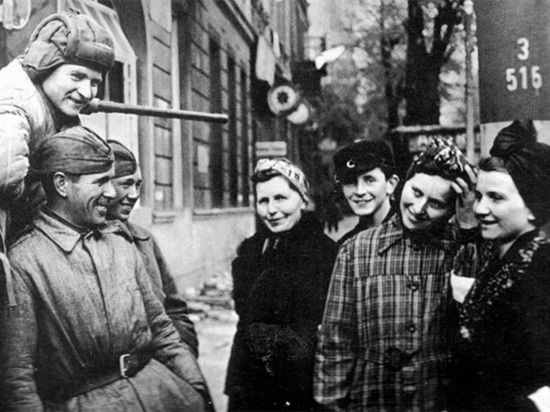Continuing with reblogs of excellent articles by Olga of the Siberian Matrëshka Telegram channel, which we can warmly recommend, let us look at the topic of the black myths created around the conduct of the Red Army on the German territory. We shall continue this topic in several subsequent posts.
Introduction by Siberian Matrëshka:
There are many speculations, outright fakes and distortions surrounding the Great Patriotic War in general and the Red Army in particular.
One of them goes like this: “When the Soviet army entered Berlin, soldiers and officers began to rape local women. In total, two million Frauleins and Fraus were raped.”Here, the theses of Goebbels’ propaganda about the Red Army being “steppe scumbags” who rape everything that moves, the fear of Berlin residents for their fate, and targeted discrediting of the Red Army’s role in World War II all converged.
“Our propaganda regarding the Russians and what the population should expect from them in Berlin was so successful that we brought the Berliners to a state of extreme horror,” noted propagandist Werner Naumann.
In Russia, this myth became popular in the 90s, when a dirty stream of all sorts of reading material, including so-called alternative historians, poured onto the market. “It became accepted to tell the truth.” Only along with the truth that was hushed up, they began to publish the truth that did not exist:
Millions of raped German women: where the legs grow from *
* that is: where something is coming from
Olga🪆May 08, 2023
In recent years, Victory Day has acquired another, alas, not very beautiful tradition: the closer the holiday, the more often all kinds of “researchers” begin to broadcast the myth of “raped Germany”.
At the same time, the number of German women allegedly affected by the Red Army only grows over the years.
Three books say that this is the “pure truth”: Martha Hillers’ book “A Woman in Berlin”, the book of the English historian Anthony Beevor “The Fall of Berlin”, and the memoirs of my compatriot WWII veteran Leonid Rabichev “War will write everything off”. All these books have one main idea: the only thing that the Soviet soldiers did, was that they drank and fucked everything that could be fucked. How such an army reached Berlin remains a mystery, nothing less than a miracle of the Lord.
I took the time to find out where these books and their authors grow their legs from. Obviously from the ass, of course, but here are the details. Moreover, I partially read these three books.
Partially, not completely, but enough to draw conclusions.
I want to remind you right away that a huge army of tired, angry and exhausted soldiers entered Berlin, and it would be extremely stupid to bet that all of them had never done anything in their lives. However, in the Soviet army, violence and looting were severely punished, it was Stalin’s personal order. More than 4,000 soldiers were sent to court for looting attempts, demoted and sent to the penal battalion. It is also documented (newspapers, leaflets) that German propaganda actively promoted the theme of evil Soviet rapists. Like, they enter cities and first of all take revenge on everyone they meet, raping women “from 8 to 80 years old” – this is a quote from German newspapers that Goebbels came up with. People were afraid, naturally rumors arose, somewhere someone told something to someone, etc., etc. And the people were really intimidated to the limit, to the point that the activists of the Nazi party killed their families first, and then themselves.
So, Martha Hillers. Here is her brief biography: Hillers was born in 1911 in Krefeld. She travelled a lot in Europe, visited the USSR, worked in Moscow, at Soyuzfoto, knew Russian well. In the mid-1930s, she began working as a journalist in Berlin and supported the National Socialists. Hillers joined the Imperial German Writers’ Union and began writing for the NSDAP propaganda newspaper Angrif, founded by Joseph Goebbels. That is, a person who began writing for Goebbels even before the start of the Second World War and who wrote the entire war, published memoirs discrediting the honour of Goebbels’ opponent and people like “oh yes, it’s true, we believe it!”. The book talks about how the author herself was repeatedly subjected to sexual violence by Soviet soldiers and, as a matter of principle, women were forced to give up their bodies in exchange for life. Hillers’ book was published in 1954 and translated into many languages, but the women of Germany boycotted the book: they claimed that they were not as fallen and easily accessible women as it is written in the book. The book was translated into Russian in 2018. Now this book is banned in Russia, as discrediting the honour of the heroes of the Second World War. Based on the book, a film was made in 2008, the film was not included in the ranks of the banned in Russia.
Continue reading




